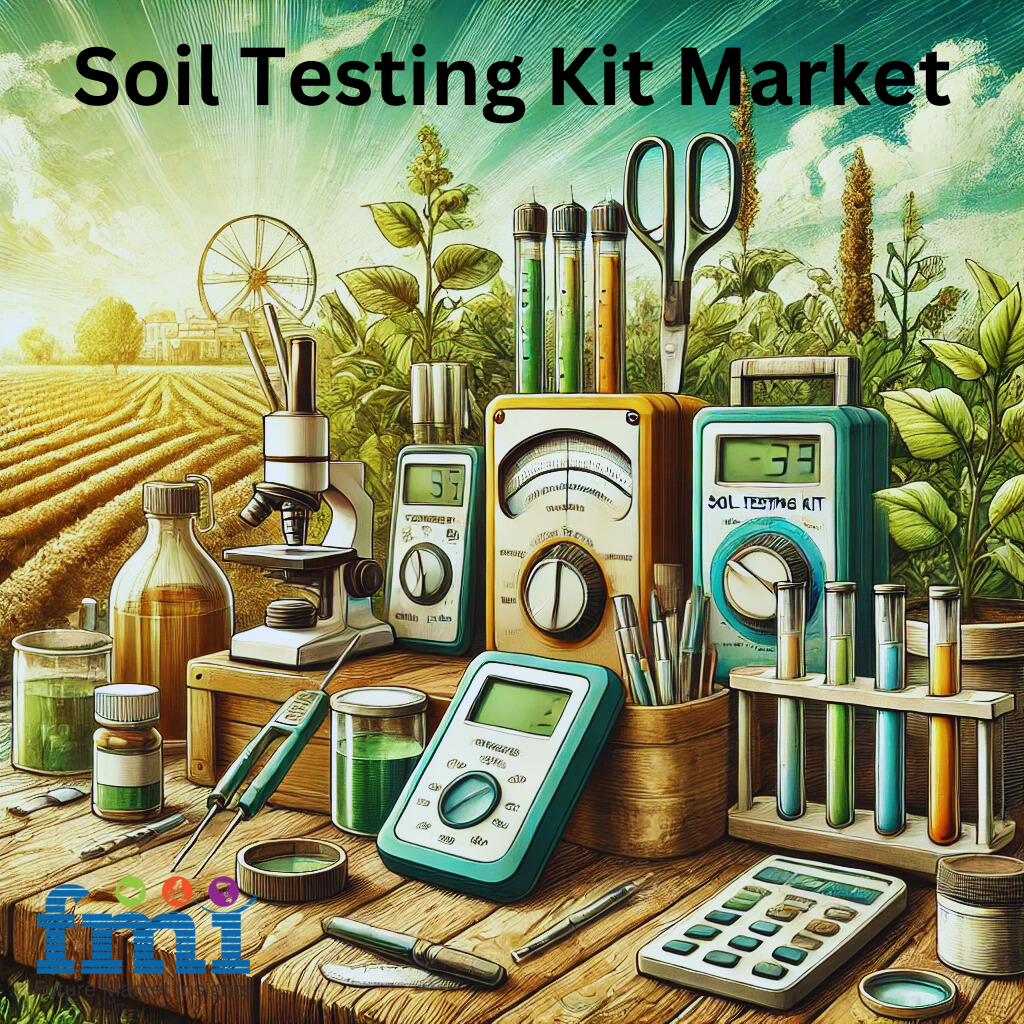
NEWARK, Del, Jan. 22, 2025 (GLOBE NEWSWIRE) -- According to a Future Market Insights (FMI), with technological advancements, rising awareness about the importance of soil quality, and the growing agricultural sector, the soil testing kit market is expected to reach a projected value of USD 16,093.8 Million by 2035 from an estimated USD 6,016.
3 Million in 2025. This represents a robust Compound Annual Growth Rate (CAGR) of 10.3% during the forecast period from 2025 to 2035.

Soil testing kits, which are critical tools for determining various soil parameters, have become integral to precision farming, construction, and environmental assessment. These kits typically include soil testing meters, reagent kits, and weighing scales to assess the soil's nutrient content, pH levels, and other essential parameters. They are indispensable in the effective application of fertilizers in agriculture and in the design of construction materials.
Market Drivers: Technological Innovation and Growing Agricultural Demand The demand for soil testing kits is being driven by a variety of factors, including the growing agricultural sector, government policies supporting sustainable farming practices, and the technological evolution of testing instruments. Precision farming, which relies heavily on soil testing to guide fertilizer application and ensure optimal crop yields, has grown exponentially with the adoption of modern agricultural practices. Moreover, with increasing awareness about the importance of soil health and its role in the environment, farmers, researchers, and land developers are turning to soil testing kits to make data-driven decisions.
Technological advancements in soil testing kits have made a significant impact on the market’s growth trajectory. Innovations such as digital soil mapping, remote sensing, and portable soil testing kits have enhanced the speed, accuracy, and convenience of soil analysis. These technologies provide real-time data collection and actionable insights, allowing farmers and environmentalists to make informed decisions to manage soil better.
The integration of advanced sensors and automated systems in modern soil testing equipment also ensures a reduction in human error, boosting the reliability and consistency of soil tests. Additionally, cloud-based platforms and mobile applications have further revolutionized soil testing by facilitating seamless data sharing, remote analysis, and improved accessibility. These digital solutions enable farmers to monitor soil health on a continual basis, ensuring that they can respond to issues before they affect productivity or environmental quality.
With the continued evolution of soil testing technologies , the market is witnessing an influx of sophisticated, cost-effective solutions designed to meet the diverse needs of the agricultural, environmental, and construction sectors. Browse Details - Uncover Future Opportunities in the Market! https://www.futuremarketinsights.
com/reports/soil-testing-kit-market Soil Testing Kits: Enhancing Fertility and Managing Sustainability Soil testing kits have a significant role to play in guiding sustainable farming practices. As global attention on environmental conservation and sustainability intensifies, soil health has emerged as a key priority. Soil testing provides critical data on fertility levels, nutrient balance, pH, and contamination, allowing farmers to make informed decisions about fertilization and crop rotation.
By ensuring optimal soil conditions, these kits enable farmers to improve yields, reduce environmental impacts, and decrease reliance on chemical fertilizers. The use of soil testing kits is also crucial in environmental monitoring, land reclamation projects, and construction. In land development, understanding soil quality is essential for assessing the potential of a site for building foundations or agricultural use.
Similarly, in environmental assessments, these kits can help in determining contamination levels, guiding remediation efforts, and assessing soil health to prevent future degradation. As more governments implement regulations aimed at promoting sustainable agriculture and reducing environmental impacts, the demand for soil testing kits will continue to rise. These tools enable stakeholders to comply with regulations, optimize their practices, and contribute to a more sustainable environment.
Key Takeaways from the Soil Testing Kit Market Report: The soil testing kit industry will grow from USD 6,016.3 Million in 2025 to USD 16,093.8 Million by 2035, with a 10.
3% CAGR . Technological innovations like remote sensing and digital mapping are driving market efficiency. Precision farming and sustainable agriculture are key growth drivers.
The USA, China, India, Germany, and Brazil are leading markets, with India and Brazil showing the highest growth rates. Government regulations promoting sustainable practices are boosting demand for soil testing kits. “The soil testing kit market is experiencing strong growth driven by technological advancements and the increasing demand for precision agriculture.
Innovations such as digital mapping and remote sensing are enhancing soil analysis efficiency. With emerging markets like India and Brazil leading growth, government support for sustainable practices is further fueling market expansion.” - opines Nikhil Kaitwade , Associate Vice President at Future Market Insights (FMI).
Regional Analysis: Key Markets for Growth The soil testing kit industry is experiencing growth across various regions, with countries such as the United States, China, Germany, India, and Brazil leading the way. The USA remains a key player in the market with a projected CAGR of 9.2% from 2025 to 2035.
The agricultural sector in the USA continues to adopt high-tech solutions to address soil management challenges, supporting the increased demand for soil testing kits. In China, where rapid agricultural modernization is underway, the market is projected to grow at a CAGR of 8.8% .
China’s focus on improving soil quality for sustainable agriculture has resulted in an increasing reliance on soil testing kits for precise soil analysis and fertilization. Similarly, in Germany, with its focus on environmentally sustainable agricultural practices, the market is expected to grow at a CAGR of 9.4% .
India is anticipated to see the highest growth rate in the soil testing kit market, with a projected CAGR of 10.6% . As the country continues to focus on boosting agricultural productivity through sustainable practices, soil testing kits are becoming essential tools for farmers looking to optimize crop yield and soil health.
Brazil, a leading agricultural producer in South America, will also experience significant market growth, with a projected CAGR of 11.2% , driven by the rising demand for soil testing in agriculture and land management. Market Outlook: Strong Growth Ahead With the global agricultural sector expanding, driven by an increasing demand for food production, soil testing kits are poised for significant growth.
The increasing adoption of precision agriculture, coupled with advancements in technology, will continue to drive demand for more sophisticated and efficient soil testing solutions. As countries like India and Brazil ramp up efforts to modernize their agricultural practices, demand for these kits will surge, particularly as sustainable farming becomes increasingly important. The market for soil testing kits is also benefiting from supportive government policies.
Various governments are introducing subsidies, grants, and incentives to encourage the use of advanced agricultural technologies, which includes soil testing. These initiatives are helping to make soil testing more accessible to farmers across the world, from small-scale family farms to large industrial agricultural enterprises. Exploring the Future of Testing Equipment: Emerging Trends, Technologies, and Market Insights – Browse Latest Testing Apparatus Reports Leading Manufacturers of Soil Testing Kits: WS Telematics Private Limited LaMOtte Company KSE Testing Equipment Harvesto Luster Leaf Products, Inc.
Merck Group Hanna Instrumental Agilent Technologies Sentera Swan Analytics Soil Testing Kit Industry Segmentation Analysis: By Kit Type : Single-Test Kit Multi-Test Kit By Testing Property Type : Chemical Testing Physical Testing Biological Testing By Testing Method : Analog Testing Digital Testing By Sales Channel : Offline Sales Online Sales By End User : Agricultural Horticulture & Landscaping Infrastructure & Construction Mining & Resource Exploration Environmental Monitoring Education & Research Others By Region : North America Latin America Western Europe South Asia Eastern Europe East Asia Middle East & Africa Old Source: https://www.globenewswire.com/news-release/2024/11/18/2982936/0/en/Soil-Testing-Kit-Market-Poised-for-Robust-Growth-Projected-to-Reach-USD-11-30-Billion-by-2032-Future-Market-Insights-Inc.
html German Translation: Laut Future Market Insights (FMI) wird erwartet, dass der Markt für Bodentestkits aufgrund des technologischen Fortschritts, des steigenden Bewusstseins für die Bedeutung der Bodenqualität und des wachsenden Agrarsektors von geschätzten 6.016,3 Millionen USD im Jahr 2025 auf einen prognostizierten Wert von 16.093,8 Millionen USD im Jahr 2035 ansteigt .
Dies entspricht einer robusten durchschnittlichen jährlichen Wachstumsrate (CAGR) von 10,3 % während des Prognosezeitraums von 2025 bis 2035. Bodentestkits sind wichtige Werkzeuge zur Bestimmung verschiedener Bodenparameter und sind aus der Präzisionslandwirtschaft, dem Bauwesen und der Umweltverträglichkeitsprüfung nicht mehr wegzudenken. Diese Kits enthalten in der Regel Bodentestmessgeräte, Reagenzienkits und Waagen zur Bestimmung des Nährstoffgehalts, des pH-Werts und anderer wichtiger Parameter des Bodens.
Sie sind unverzichtbar für die effektive Anwendung von Düngemitteln in der Landwirtschaft und für die Entwicklung von Baumaterialien. Markttreiber: Technologische Innovation und wachsende landwirtschaftliche Nachfrage Die Nachfrage nach Bodentestkits wird durch eine Reihe von Faktoren angetrieben, darunter der wachsende Agrarsektor, staatliche Richtlinien zur Förderung nachhaltiger landwirtschaftlicher Praktiken und die technologische Entwicklung von Testinstrumenten. Die Präzisionslandwirtschaft, die in hohem Maße auf Bodentests angewiesen ist, um die Düngemittelanwendung zu steuern und optimale Ernteerträge sicherzustellen, hat mit der Einführung moderner landwirtschaftlicher Praktiken exponentiell zugenommen.
Darüber hinaus greifen Landwirte, Forscher und Landentwickler angesichts des zunehmenden Bewusstseins für die Bedeutung der Bodengesundheit und ihrer Rolle für die Umwelt auf Bodentestkits zurück, um datengestützte Entscheidungen zu treffen. Technologische Fortschritte bei Bodentestkits haben die Wachstumskurve des Marktes erheblich beeinflusst. Innovationen wie digitale Bodenkartierung, Fernerkundung und tragbare Bodentestkits haben die Geschwindigkeit, Genauigkeit und Benutzerfreundlichkeit der Bodenanalyse verbessert.
Diese Technologien ermöglichen die Datenerfassung in Echtzeit und umsetzbare Erkenntnisse, sodass Landwirte und Umweltschützer fundierte Entscheidungen für eine bessere Bodenbewirtschaftung treffen können. Die Integration fortschrittlicher Sensoren und automatisierter Systeme in moderne Bodentestgeräte sorgt außerdem für eine Reduzierung menschlicher Fehler und erhöht die Zuverlässigkeit und Konsistenz von Bodentests. Darüber hinaus haben Cloud-basierte Plattformen und mobile Anwendungen die Bodenuntersuchung weiter revolutioniert, indem sie einen nahtlosen Datenaustausch, Fernanalysen und eine verbesserte Zugänglichkeit ermöglichen.
Diese digitalen Lösungen ermöglichen es Landwirten, die Bodengesundheit kontinuierlich zu überwachen und sicherzustellen, dass sie auf Probleme reagieren können, bevor diese die Produktivität oder die Umweltqualität beeinträchtigen. Mit der fortschreitenden Weiterentwicklung der Bodenuntersuchungstechnologien erlebt der Markt einen Zustrom anspruchsvoller, kostengünstiger Lösungen, die den vielfältigen Anforderungen der Agrar-, Umwelt- und Baubranche gerecht werden sollen. Bodentest-Kits: Fruchtbarkeit steigern und Nachhaltigkeit managen Bodentestkits spielen eine wichtige Rolle bei der Förderung nachhaltiger landwirtschaftlicher Praktiken.
Da die globale Aufmerksamkeit auf Umweltschutz und Nachhaltigkeit zunimmt, ist die Bodengesundheit zu einer wichtigen Priorität geworden. Bodentests liefern wichtige Daten zu Fruchtbarkeitsgrad, Nährstoffbilanz, pH-Wert und Kontamination, sodass Landwirte fundierte Entscheidungen über Düngung und Fruchtfolge treffen können. Indem diese Kits optimale Bodenbedingungen gewährleisten, können Landwirte ihre Erträge steigern, Umweltauswirkungen reduzieren und weniger auf chemische Düngemittel angewiesen sein.
Die Verwendung von Bodentestkits ist auch bei der Umweltüberwachung, Landgewinnungsprojekten und im Bauwesen von entscheidender Bedeutung. Bei der Landentwicklung ist das Verständnis der Bodenqualität von entscheidender Bedeutung, um das Potenzial eines Standorts für Gebäudefundamente oder die landwirtschaftliche Nutzung einzuschätzen. In ähnlicher Weise können diese Kits bei Umweltbewertungen dabei helfen, den Kontaminationsgrad zu bestimmen, Sanierungsmaßnahmen zu leiten und die Bodengesundheit zu beurteilen, um zukünftige Verschlechterungen zu verhindern.
Da immer mehr Regierungen Vorschriften zur Förderung einer nachhaltigen Landwirtschaft und zur Verringerung der Umweltauswirkungen erlassen, wird die Nachfrage nach Bodentestkits weiter steigen. Diese Tools ermöglichen es den Beteiligten, Vorschriften einzuhalten, ihre Praktiken zu optimieren und zu einer nachhaltigeren Umwelt beizutragen. Wichtige Erkenntnisse aus dem Marktbericht für Bodentestkits: Die Branche der Bodentestkits wird von 6.
016,3 Millionen US-Dollar im Jahr 2025 auf 16.093,8 Millionen US-Dollar im Jahr 2035 wachsen, was einer durchschnittlichen jährlichen Wachstumsrate von 10,3 % entspricht . Technologische Innovationen wie Fernerkundung und digitale Kartierung steigern die Markteffizienz.
Präzisionslandwirtschaft und nachhaltige Landwirtschaft sind wichtige Wachstumstreiber. Die führenden Märkte sind die USA, China, Indien, Deutschland und Brasilien, wobei Indien und Brasilien die höchsten Wachstumsraten aufweisen. Staatliche Vorschriften zur Förderung nachhaltiger Praktiken steigern die Nachfrage nach Bodentestkits.
„Der Markt für Bodentestkits wächst stark, angetrieben durch technologische Fortschritte und die steigende Nachfrage nach Präzisionslandwirtschaft. Innovationen wie digitale Kartierung und Fernerkundung verbessern die Effizienz der Bodenanalyse. Da Schwellenmärkte wie Indien und Brasilien das Wachstum anführen, treibt die staatliche Unterstützung nachhaltiger Praktiken die Marktexpansion weiter voran“, meintNikhil Kaitwade, Associate Vice President bei Future Market Insights (FMI).
Regionale Analyse: Wichtige Wachstumsmärkte Die Branche der Bodentestkits verzeichnet in verschiedenen Regionen Wachstum, wobei Länder wie die USA, China, Deutschland, Indien und Brasilien führend sind. Die USA bleiben mit einer prognostizierten durchschnittlichen jährlichen Wachstumsrate von 9,2 % von 2025 bis 2035 ein wichtiger Akteur auf dem Markt. Der Agrarsektor in den USA setzt weiterhin Hightech-Lösungen ein, um Herausforderungen im Bodenmanagement zu bewältigen, was die gestiegene Nachfrage nach Bodentestkits unterstützt.
In China, wo die Landwirtschaft derzeit rasant modernisiert wird, wird für den Markt ein jährliches Wachstum von 8,8 % prognostiziert . Da China sich auf die Verbesserung der Bodenqualität für eine nachhaltige Landwirtschaft konzentriert, werden zunehmend Bodentestkits für präzise Bodenanalysen und Düngung eingesetzt. Auch in Deutschland, wo ökologisch nachhaltige landwirtschaftliche Praktiken im Mittelpunkt stehen, wird für den Markt ein jährliches Wachstum von 9,4 % erwartet .
Indien wird voraussichtlich mit einer prognostizierten durchschnittlichen jährlichen Wachstumsrate von 10,6 % das höchste Wachstum auf dem Markt für Bodentestkits verzeichnen . Da das Land weiterhin darauf bedacht ist, die landwirtschaftliche Produktivität durch nachhaltige Praktiken zu steigern, werden Bodentestkits zu unverzichtbaren Werkzeugen für Landwirte, die ihre Ernteerträge und Bodengesundheit optimieren möchten. Brasilien, ein führender Agrarproduzent in Südamerika, wird aufgrund der steigenden Nachfrage nach Bodentests in der Landwirtschaft und Landbewirtschaftung ebenfalls ein signifikantes Marktwachstum mit einer prognostizierten durchschnittlichen jährlichen Wachstumsrate von 11,2 % verzeichnen.
Marktausblick: Starkes Wachstum voraus Da der globale Agrarsektor aufgrund der steigenden Nachfrage nach Nahrungsmitteln wächst, stehen Bodentestkits vor einem erheblichen Wachstum. Die zunehmende Einführung der Präzisionslandwirtschaft in Verbindung mit technologischen Fortschritten wird die Nachfrage nach anspruchsvolleren und effizienteren Bodentestlösungen weiter ankurbeln. Da Länder wie Indien und Brasilien ihre Bemühungen zur Modernisierung ihrer landwirtschaftlichen Praktiken verstärken, wird die Nachfrage nach diesen Kits steigen, insbesondere da nachhaltige Landwirtschaft immer wichtiger wird.
Der Markt für Bodentestkits profitiert auch von unterstützenden Regierungsmaßnahmen. Verschiedene Regierungen führen Subventionen, Zuschüsse und Anreize ein, um den Einsatz fortschrittlicher landwirtschaftlicher Technologien, zu denen auch Bodentests gehören, zu fördern. Diese Initiativen tragen dazu bei, Bodentests für Landwirte auf der ganzen Welt zugänglicher zu machen, von kleinen Familienbetrieben bis hin zu großen industriellen Agrarunternehmen.
Führende Hersteller von Bodentest-Kits: WS Telematics Private Limited LaMOtte Company KSE-Testgeräte Ernte Luster Leaf Products, Inc. Merck-Konzern Hanna Instrumental Agilent-Technologien Sentera Swan Analytics Segmentierungsanalyse der Bodentestkit-Branche: Nach Kit-Typ : Einzel-Testkit Multi-Testkit Nach Testen des Eigenschaftstyps : Chemische Tests Physikalische Tests Biologische Tests Nach Testmethode : Analoge Tests Digitales Testen Nach Vertriebskanal : Offline-Verkäufe Online-Verkäufe Nach Endbenutzer : Landwirtschaftlich Garten- und Landschaftsbau Infrastruktur & Bau Bergbau und Rohstoffexploration Umweltüberwachung Bildung & Forschung Sonstiges Nach Region : Nordamerika Lateinamerika Westeuropa Südasien Osteuropa Ostasien Naher Osten und Afrika Authored By: Nikhil Kaitwade (Associate Vice President at Future Market Insights, Inc.) has over a decade of experience in market research and business consulting.
He has successfully delivered 1500+ client assignments, predominantly in Automotive, Chemicals, Industrial Equipment, Oil & Gas, and Service industries. His core competency circles around developing research methodology, creating a unique analysis framework, statistical data models for pricing analysis, competition mapping, and market feasibility analysis. His expertise also extends wide and beyond analysis, advising clients on identifying growth potential in established and niche market segments, investment/divestment decisions, and market entry decision-making.
Nikhil holds an MBA degree in Marketing and IT and a Graduate in Mechanical Engineering. Nikhil has authored several publications and quoted in journals like EMS Now, EPR Magazine, and EE Times. Explore Future Market Insights, Inc.
Extensive Coverage in Testing Equipment Domain: The global soil field testing equipment market valuation forecasted to reach USD 1.1 Billion by 2033. The global mercury testing service market revenue share anticipated to exceed USD 1583.
95 Million by 2032. The global biofuel testing services market size projected to reach USD 4.82 Billion by 2032.
The global agricultural testing services market share estimated to exceed USD 10.6 Billion by 2033. The global borehole yield testing demand is projected to surge steadily at 3 to 5% CAGR from 2021 to 2031.
The global agricultural mapping services sales expected to drive past USD 7.7 Billion by 2035. The global seed testing services industry is anticipated to hit USD 1639.
16 Million by 2032. The global fertigation control system market is forecasted to reach USD 2.6 Billion milestone by 2033.
The global lubricant testing machine market value forecasted to cross USD 110 Billion by 2032. The global micro ohmmeter market revenue estimated to surpass USD 1000 Million by 2032 end. About Future Market Insights (FMI): Future Market Insights (FMI) is a leading provider of market intelligence and consulting services, serving clients in over 150 countries.
FMI is headquartered in Dubai, and has delivery centers in the UK, U.S. and India.
FMI's latest market research reports and market analysis help businesses navigate challenges and make critical decisions with confidence and clarity amidst breakneck competition. Our customized and syndicated market research reports deliver actionable insights that drive sustainable growth. A team of expert led analysts at FMI continuously tracks emerging trends and events in a broad range of industries to ensure that our clients prepare for the evolving needs of their consumers.
Join us as we commemorate 10 years of delivering trusted market insights. Reflecting on a decade of achievements, we continue to lead with integrity, innovation, and expertise. Contact Us: Future Market Insights Inc.
Christiana Corporate, 200 Continental Drive, Suite 401, Newark, Delaware - 19713, USA T: +1-347-918-3531 For Sales Enquiries: [email protected] Website: https://www.futuremarketinsights.
com LinkedIn | Twitter | Blogs | YouTube.















